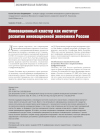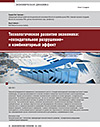Innovation Cluster as an Institution for Developing Russia’s Innovative Economy
DOI: https://doi.org/10.33917/es-3.183.2022.64-69
Supply support policy, which is becoming more and more relevant in Europe and America due to overheated demand, is also relevant for Russia. At the same time, active growth of the state’s information capabilities can be used to mutually coordinate the goals of social and economic development under condition of the focus on integrated development of the innovation environment and in case when the innovation cluster is the optimal institution. First of all, it forms the structure of innovative industry with a wide layer of small and medium-sized businesses, reducing transaction costs. Secondly, the combination of competition and cooperation in a cluster is especially advantageous in the innovation culture of Russia, which is distinguished by the intrinsic value of mastery and innovative community. Thirdly, the cluster makes possible to resolve a conflict between digital platforms and local economy, using the advantages of digitalization and localization to meet mutual interests that contributes to the public welfare growth.
Источники:
1. Obzor mezhdunarodnoi praktiki podderzhki ekonomiki i naseleniya v usloviyakh bor’by s pandemiei koronavirusa v Armenii, Velikobritanii, Germanii, Danii, Ispanii, Italii, Kazakhstane, Kitae, Niderlandakh, SShA, Finlyandii, Frantsii, Shvetsii, Yuzhnoi Koree, Yaponii [Review of International Practice of Supporting the Economy and the Population in the Context of Fighting the Coronavirus Pandemic in Armenia, Great Britain, Germany, Denmark, Spain, Italy, Kazakhstan, China, Netherlands, USA, Finland, France, Sweden, South Korea, Japan], available at: https://isp.hse.ru/data/2020/04/29/1544579194/COVID-19_stimulus%20packages_countries260420.pdf.
2. Cochrane J.D. The Revenge of Supply. Project Syndicate, available at: https://www.project-syndicate.org/commentary/supply-shortages-inflation-result-ofgovernment-policies-by-john-h-cochrane-2021-10.
3. Makhalina O.M., Makhalin V.N. Svoevremennye i adekvatnye mery po podderzhke ekonomiki i naseleniya Rossii v period pandemii [Timely and Adequate Measures to Support the Economy and Population of Russia During the Pandemic]. Vestnik RGGU. (Seriya: Ekonomika. Upravlenie. Pravo), 2021, no 1, pp. 56–70.
4. Vlasova V., Roud V. Cooperative Strategies in the Age of Open Innovation: Choice of Partners, Geography and Duration. Foresight and STI Governance, 2020, vol. 14, no 4, pp. 80–94, DOI: 10.17323/2500-2597.2020.4.80.94.
5. Bator F.M. Fine Tuning. In: Eatwell J., Milgate M., Newman P. (eds) The World of Economics. The New Palgrave, Palgrave Macmillan, London, 1991, available at: https://doi.org/10.1007/978-1-349-21315-3_35.
6. Minski Kh. Stabiliziruya nestabil’nuyu ekonomiku [Stabilizing Unstable Economy]. Moscow, Saint-Petersburg, Izd-vo Instituta Gaidara, fakul’tet svobodnykh iskusstv i nauk SPbGU, 2017, 624 p.
7. Berdin A.E., Berdina M. Regional’nye osobennosti razvitiya osobykh ekonomicheskikh zon. Na primere stran latinoamerikanskogo regiona [Regional Specific Features of Development of Special Economic Zones. On the Example of the Latin American Countries]. Latinskaya Amerika, 2021, no 3, pp. 33–54.






